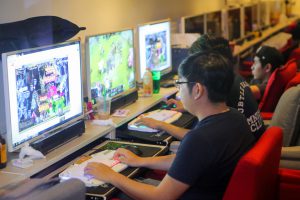Effects of Digital Gaming Among Children and Adolescents in Singapore – A Summary of Research Findings
June 23, 2022

On 22 June 2020, HealthHub, an online portal by the Ministry of Health Singapore, published an article on screen time and gaming addiction (https://www.healthhub.sg/live-healthy/178/stuckintheweb). The article warns readers about the dangers of cyber addiction and offered tips to help a friend or family member who may be addicted to online gaming.
Video games have controversial effects. Whereas some gamers posit potential benefits, some scholars warn of the risk of addiction and inciting violence. Dr Angeline Khoo (former Associate Professor at the National Institute of Education), Associate Professor Vivian Hsueh Hua Chen (NTU Wee Kim Wee School of Communication and Information), and Associate Professor Hyekyung Choo (NUS Social Work) contribute to the discussion in ‘Effects of Digital Gaming Among Children and Adolescents in Singapore – A Summary of Research Findings’, a chapter in New Media and Learning in the 21st Century: A Socio-Cultural Perspective (Springer, 2015).
In this three year longitudinal study, the researchers sought to provide deeper understanding of the positive and negative effects of gaming. Approximately 2,500 primary and secondary school students in Singapore were issued questionnaires. This was followed up by 90 face-to-face interviews to understand how playing video games affected social interactions.
The researchers discovered that tangible effects (e.g. lack of sleep or poorer academic results) were symptomatic of escapism. Video games were used as a coping mechanism to deal with daily stresses and mental health issues. Time spent playing video games would also decrease attention span and increase impulsivity, and could develop a cyclical relationship that exacerbated the problems.
Nonetheless, video games provided benefits for children and adolescents. Playing video games with friends would strengthen friendship bonds, and prosocial games would encourage more social behaviour. Video games also did not affect family time as youths played video games while their parents were busy with work or household chores.
From this study, the researchers hope social agencies may better understand the needs and perspective of at-risk gamers. More effective strategies to support the social growth of these youths are welcomed.
Read the chapter here.
